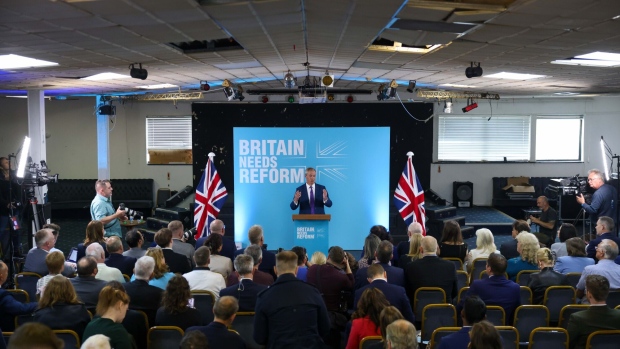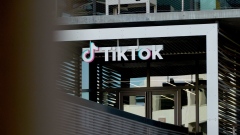Jun 17, 2024
Farage Targets ‘Bridgehead’ at UK Vote to Build Right-Wing Bloc
, Bloomberg News

(Bloomberg) -- Nigel Farage set out an “unashamedly radical” manifesto as he tries to win seats for his Reform UK party, including a series of pledges even he said were not designed to be implemented after the July 4 general election.
“It’s radical, it’s fresh thinking, it’s outside the box,” Farage said as he held up Reform UK’s manifesto — the party calls it a “contract” — on Monday. “This is not something with which we’re going to govern the country.”
In total, Reform said its manifesto includes £90 billion of tax cuts and £50 billion of spending increases. Key policies include raising the threshold at which people pay income tax, scrapping inheritance tax on most estates and erasing National Health Service waiting lists — which currently stand at 7.5 million — within two years, as well as coming up with a new healthcare funding model.
He also reiterated he would try to make it an “immigration election,” as he tied economic and social problems to high net migration. It’s a line straight from the Farage playbook that’s been a fixture in British politics since before Brexit. He said people who voted to leave the European Union have been let down by the “failure of a sovereign government to implement the will of the people.”
Farage has said he expects Reform UK to get more votes than the 3.8 million secured in 2015 by the UK Independence Party, which he led at the time. The party has been building momentum since he announced his candidacy to stand in the seaside town of Clacton, with one YouGov poll last week showing Reform ahead of the Conservative Party for the first time.
On Monday, he seized on that data point — which is not matched by other pollsters — to declare Reform as the real “opposition to Labour.” That’s despite the fact that in Britain’s first-past-the-post voting system, Reform UK is still predicted to only win a handful of seats.
Nevertheless, growing support for Reform is a significant headache for Prime Minister Rishi Sunak, because it means the right-wing vote is likely to be split between the Tories and Farage’s party. That makes it more likely that Labour will win a large majority, as polls currently suggest.
The problem facing the Tories and Labour is that Farage’s influence doesn’t hinge on traditional arguments about whether his ideas are deliverable. Instead, just as in the Brexit vote, it’s more about appealing to voters who think Britain has lost its way and what Reform UK calls its “common sense” solutions.
After Farage spoke, economists pointed out how the sums — Reform UK included £150 billion of cuts in some departments to fund the tax cuts and spending increases in other areas — don’t add up.
“The package as a whole is problematic,” said Carl Emmerson, deputy director at the influential Institute for Fiscal Studies. “Spending reductions would save less than stated, and the tax cuts would cost more than stated, by a margin of tens of billions of pounds per year.”
But during the press conference and in a series of media interviews later, Farage responded with trademark chutzpah. He said Labour’s victory is guaranteed and that Reform UK’s manifesto is the basis for challenging the government for five years over the next Parliament. By using it to win seats this time, Reform UK would have a “bridgehead” to become the main right-wing force in British politics in 2029, he said.
“I genuinely believe that our campaign now has some momentum,” Farage said. “We’ve outlined where we are going to challenge Labour.”
The Tories hit back, warning voters that backing Farage’s party would make it more likely that Labour wins a large majority. Outgoing Tory cabinet minister Michael Gove called Farage’s aspiration to one day be prime minister “ridiculous” and said he’s “part of a great entertainment machine.”
“He is not someone who can govern this country,” Gove said on Times Radio. “Reform is a giant ego trip, not a serious program of alternative change.”
©2024 Bloomberg L.P.







